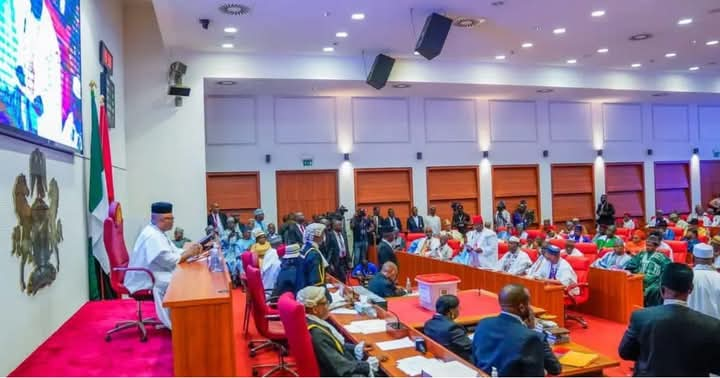Accountability is key: The Senate warns MDAs that without proper reforms, 2025 budget allocations will be withheld. Read about the implications.”
The Nigerian Senate has issued a strong warning to federal ministries, departments, and agencies (MDAs), indicating that they may face budget allocation denials for the 2025 fiscal year if they do not appear before the Senate to justify their expenditures from the 2024 appropriations.
This warning was delivered during an investigative hearing focused on fiscal accountability, revenue remittance, and financial management, chaired by Senator Sani Musa.
The committee raised concerns regarding inconsistencies in Nigeria’s revenue generation and expenditure tracking, urging enhanced cooperation between the Office of the Accountant General of the Federation and the legislature.
Lawmakers criticized the discrepancies in financial records submitted by certain agencies, with Senator Musa emphasizing the need to resolve these issues to uphold transparency and accountability in governance.
He cautioned that any agency failing to attend the committee meeting to defend its financial records would jeopardize its budget allocation for 2025. The Accountant General of the Federation, Oluwatoyin Madein, and her team were present to address questions regarding financial irregularities.
Senator Musa highlighted that this performance evaluation of the MDAs is crucial for the upcoming budget, asserting that agencies must provide detailed accounts of their 2024 expenditures to avoid receiving no allocation in 2025.
He also pointed out the challenges in accessing accurate data on federal funds, which hinders effective oversight and policymaking, stressing the need for clarity on revenue collection and allocation.
Concerns have been raised regarding inconsistencies in the reports from the Nigerian National Petroleum Company Limited (NNPCL) and the federation account, as well as the dividends from LNG operations and other notable discrepancies.
The committee emphasized the necessity for transparency concerning loans, grants, and other financial inflows under government management.
Prior to the threat, the Accountant General of the Federation had provided a summary of the federal government’s internally generated revenue up to September 2024, indicating an N8 billion capital allocation for 2024, of which only N2.9 billion (25%) had been disbursed for project implementation.
Lawmakers expressed that the unspent funds hindered other agencies from obtaining essential resources, further delaying operations, and criticized the policy of centralizing all payments in the Accountant General’s office for creating bureaucratic obstacles.
They highlighted that this approach often led to ministries, departments, and agencies (MDAs) waiting months for payments post-project execution, thereby impeding government functions and public initiatives. Additionally, concerns were voiced about contractors being pressured to pay unofficial fees, reportedly 5% of the contract value, to expedite their payments.
The reported figures included independent revenue of N2.7 trillion, an operating surplus from government-owned enterprises (GOEs) of N2.3 trillion, and N344 billion in internally generated revenue from MDAs.
However, the committee noted that the report submitted was limited to the Accountant General’s Office, lacking comprehensive details on the federal government’s overall financial activities.
In light of the identified gaps, the committee decided to invite other pertinent agencies, including the Revenue Mobilization Allocation and Fiscal Commission (RMAFC), the Nigerian Extractive Industries Transparency Initiative (NEITI), and the NNPCL, for a collaborative session aimed at thoroughly reviewing the discrepancies.
It is essential to have all stakeholders present simultaneously to ensure clarity and consistency in their reports, rather than hearing from each side separately.
Senator Sani noted that the Senate hearing signifies a concerted effort to enhance Nigeria’s financial oversight and accountability, emphasizing a commitment to transparency and a strong fiscal policy framework.
The committee members, including the chairman, expressed significant frustration regarding the ongoing delays in capital budget release and utilization, attributing these issues to inefficiencies in the centralized payment system overseen by the Office of the Accountant General of the Federation.
They criticized the policy that mandates over 700 ministries, departments, and agencies to process payments through a single office, arguing that it has resulted in inefficiencies, project delays, and a loss of public trust, particularly in areas awaiting critical infrastructure development.
Additionally, concerns were raised about contractors allegedly needing to pay informal fees, reportedly 5% of the contract value, to expedite payments, which, if substantiated, would pose a serious accountability issue and hinder system efficiency.
The Accountant General disclosed that stamp duty revenues from 2020 to 2024 were disappointingly low at ¦ 30.3 million, in stark contrast to the ¦ 301.49 million generated internally. Lawmakers attributed this to poor budget performance, noting that taxes are collected only upon payment completion.
In her defense, the Accountant General stated that the centralized payment system was implemented to address inefficiencies and prevent the annual rollover of unutilized funds.
Ultimately, the committee has given the Accountant General until tomorrow to submit all requested reports in preparation for a follow-up meeting scheduled for 2 PM that same day.
Members expressed intentions to call upon additional agencies, such as the Nigerian National Petroleum Company Limited (NNPCL) and the Nigerian Extractive Industries Transparency Initiative (NEITI), to clarify inconsistencies in their reports. They emphasized the necessity for Ministries, Departments, and Agencies (MDAs) to have increased autonomy in budget management while ensuring oversight to prevent potential misuse.
Senator Amos Yohanna from Adamawa North highlighted the issue by stating that the federal government’s revenue is adversely affected due to poor budget performance, with low tax payments contributing to the problem.
He advocated for the establishment of a more effective system.
The committee sought clarification on the primary concern regarding the delays in fund disbursement, even for projects that have been completed and uploaded.
The accountant-general was requested to provide a comprehensive account of the obstacles faced and to suggest viable solutions.
The Senate is anticipated to discuss the possibility of reforming or eliminating the centralized payment system to ensure that Nigeria’s budget implementation aligns with the needs of its citizens and promotes development.
Peoplesmind




